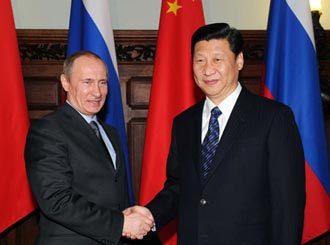Xi Jinping has chosen Moscow and a summit with Vladimir Putin for his first foreign visit after he takes office as China’s president. The implications of snubbing the world’s superpower for a diminished military ally suggests the tack Xi is likely to take in his dealings with the US during his decade as China’s top leader.
The precise date of Xi’s Moscow trip hasn’t been revealed pending his March 5 ascension to the post of China’s official head of state. It will likely come at least six months and possibly several other foreign visits ahead of any likely visit to Washington despite early efforts by the US to arrange a summit.
With over twice the population and eight times the GDP, the US dwarfs Russia both as a market for China’s exports and as a potential partner in world peace. But the “pivot to Asia” doctrine announced by President Obama last spring has been interpreted by Beijing as an “encircle and contain China” doctrine, posing a threat to its ambitions of emerging as Asia’s preeminent power, one capable of having its way in historic territorial disputes with Japan, India, the Philippines, Vietnam — as well as its claim as the sole legitimate government of Taiwan.
Xi’s summit schedule reflects Beijing’s increasing willingness to risk alienating potential partners to deal from a position of strength. Despite its diminished geopolitical stature and second-tier economy Russia remains the only nuclear power capable of assuring the US’s total destruction. A secure alliance with Moscow gives China the nuclear muscle to treat with the US as an equal on perhaps the most fundamental level of geopolitics.
Even in peaceful competition Russia is China’s most important resource, literally. With a land mass over three times the size of the US, Russia can provide China virtually every natural resource it needs, including vast, fallow tracts of arable land and an abundant supply of oil and gas. Chinese farmers have already become an important presence in the sparsely-populated Siberian region, and even as far west as agricultural lands outside St Petersburg and Moscow. Their efforts provide not only food to export to China but more abundant food supplies for Russians who have generally failed to distinguish themselves in agricultural efficiency.
Only Moscow’s wariness about becoming colonized by a nation nearly ten times as populous has kept it from being more accommodating to Chinese ambitions of turning it into a vast plantation. The extent to which Moscow has accepted Chinese farmers is less a reflection of friendly feelings than recognition that it needs industrious farmers more than China needs Russian farmland. After all, China is getting relatively easy access to equally vast tracts of arable land in former satellites like the Ukraine and Kazakhstan.
An even bigger prize for China would be pipeline access to Russian oil. So far Moscow has resisted China’s offers for a pipeline deal worth hundreds of billions, partly because it can sell its oil to Europe and partly because such a deal would bring Russia a big step closer to becoming a Chinese colony. But China’s embrace is becoming increasingly attractive now as Europe’s economy falters and China’s continues roaring ahead. The recent tiff with the US has also made Moscow more susceptible to Chinese overtures.
Even toward Moscow Beijing is showing its tendency to secure a position of strength before embarking on negotiations. Earlier this week China secured control over Pakistan’s Gwadar Port which gives future overland access to Mideast oil. That makes a pipeline deal with Russia less critical from a security standpoint. No doubt the new situation will be factored into the negotiations between Xi and Putin when they meet.
An enhanced relationship with Russia will give Xi a few more cards in the hole when he comes to play poker with Obama. The same can be said of Xi’s dealings with Abe, the US’s top Asian ally. Russia’s territorial dispute with Japan over the Kurils makes it a natural ally of China in its claim over the Senkakus (Diaoyudao). Xi and the other top leaders in Beijing may even think of the diplomatic primacy granted Moscow as China’s “Pivot to Europe”. Just as the US is seeking to hem in China’s influence in the western Pacific, China now has the economic muscle and consumption power to expand its influence toward the west overland via Russia.
Once China has become the prime trading partner and investor in Russia — hardly a distant prospect — it will have a secure European base from which to begin its encirclement of a declining western Europe. In time that may let Beijing achieve parity with Washington in the new Great Game.

